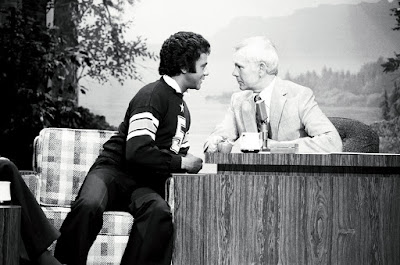Johnny Mathis On Being Gay and His Entertainment Life from Another Era
 |
Mathis with Johnny Carson in 1979.
Paul Drinkwater/NBC/NBCU Photo Bank via Getty Images
|
At his penthouse in Beverly Hills, Johnny Mathis has no objection to a 9 a.m. interview — he has been up for five hours already, and at the gym for a long-standing regime of pulley stretching and leg lifts. “Anything to get the juices flowing and also get me into my stage clothes,” says the 81-year-old singer. “I look at myself in the mirror and go, ‘Well, not bad,’ ” he adds with a laugh.
Mathis has been donning those stage clothes all year, on a tour marking the 60th anniversary of his debut album. He is a singular vocalist whose classic hits from the 1950s — “Chances Are,” “Misty,” “It’s Not for Me to Say” — established an enduring style of pop romance. In Barry Levinson’s Oscar-nominated 1982 film Diner, set in the postwar era, the character Eddie Simmons memorably asks his pals, “When you’re making out, which do you prefer, Sinatra or Mathis?”
A native of Texas, raised in California and the fourth of seven children, Mathis caught his father’s passion for music at a young age. He began vocal lessons, including classical and operatic styles, at age 13. Yet, in high school, he also was talented enough at track and field to get an athletic scholarship to San Francisco State University and, later, an invitation to try out for the U.S. team heading to the 1956 Summer Olympics in Melbourne, Australia.
Around that same time, however, while performing at a San Francisco nightclub, Mathis caught the ear of George Avakian, head of jazz A&R at Columbia Records, who was vacationing in the city. “Have found phenomenal 19-year-old boy who could go all the way,” Avakian telegrammed his label. “Send blank contracts.”
In the six decades since, Mathis has charted 43 hit singles and sent 74 titles, including numerous Christmas releases, onto the Billboard 200. In 2003, The Recording Academy presented Mathis with a Grammy Award for lifetime achievement. It was recognition for an artist who has long sung of romance— but also has supported civil rights and gay rights, from singing with activists at the Salute to Freedom concert in Birmingham, Ala., in 1963 to acknowledging his own sexual orientation two decades later.
You were part of a generation of racial pioneers in pop in the ’50s who crossed over to white fans. What’s your perspective on Black Lives Matter and race relations today?
The world changes. The world is completely different now from when I was growing up. Back then you didn’t say things like they say now out loud, about race and things. But that’s just progress. When are we going to find out that we’re all the same, we’re all absolutely, without a doubt, the same? It doesn’t matter whether you’re black or white or straight or gay.
You’ve seen a lot of change in attitudes toward being gay since you were getting death threats in the 1980s. [The threats followed a 1982 interview in Us Weekly in which Mathis was quoted as saying, “Homosexuality is a way of life I’ve become accustomed to.”]
Things take time. People are stubborn about what they perceive to be the right thing or the wrong thing, and it takes a long time to filter this human condition. There’s a waiting period until people catch up. But if you have patience — which it takes when someone thinks differently from you — everybody always catches up. That patience is a wonderful virtue.
You have declined to talk about your own relationships, and it seems that you prefer to lead by your presence rather than speaking out.
I’ve been very happy to see some of the success that I’ve had along the way in opening the eyes of people, especially people who listen to music.
Looking back, what do you remember about George Avakian discovering you at San Francisco’s 440 Club?
I didn’t realize he was in the audience, and unfortunately he had a bad case of poison oak or poison ivy. So he was not in a very good mood. But he heard me sing and said, “I think you’re ready to make your first recording.” George is still with us; He’s now 102 years old, and I saw him not too long ago. He counseled me for many years.
Gary Graff

Comments